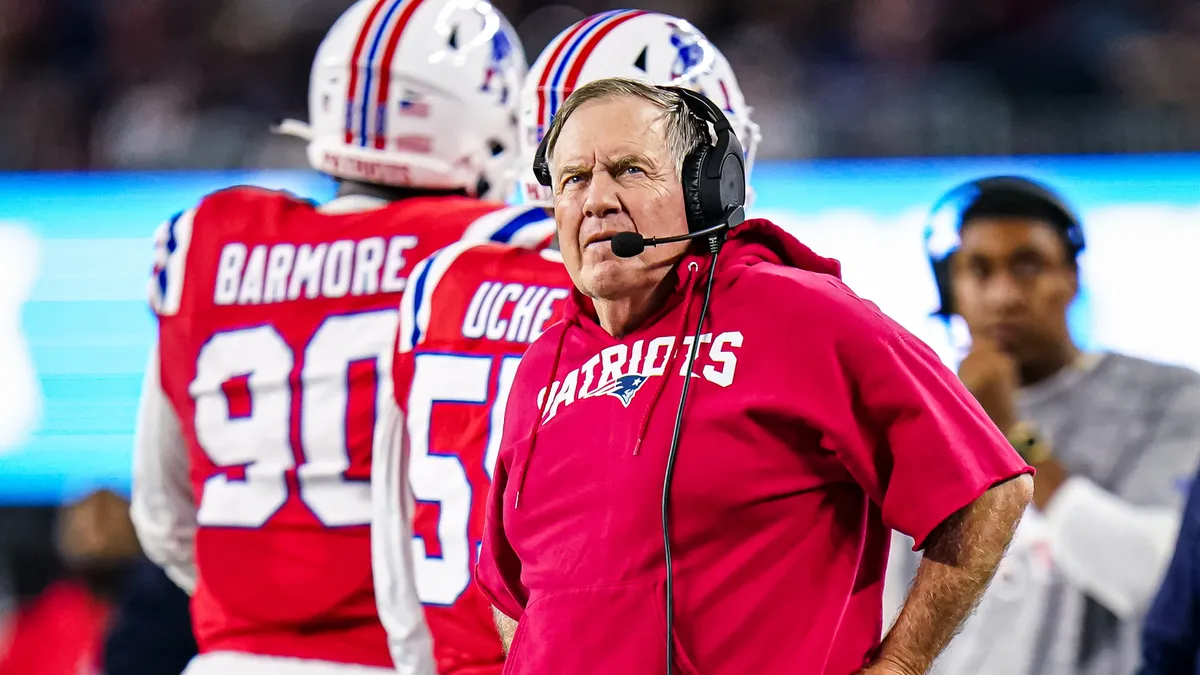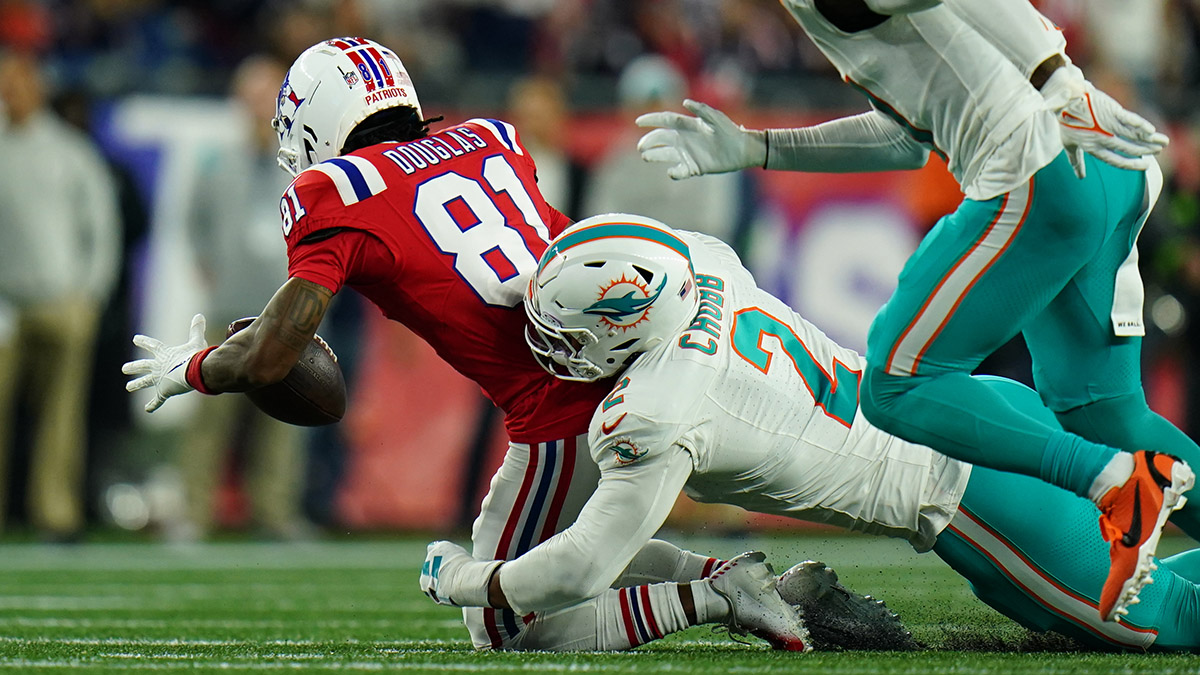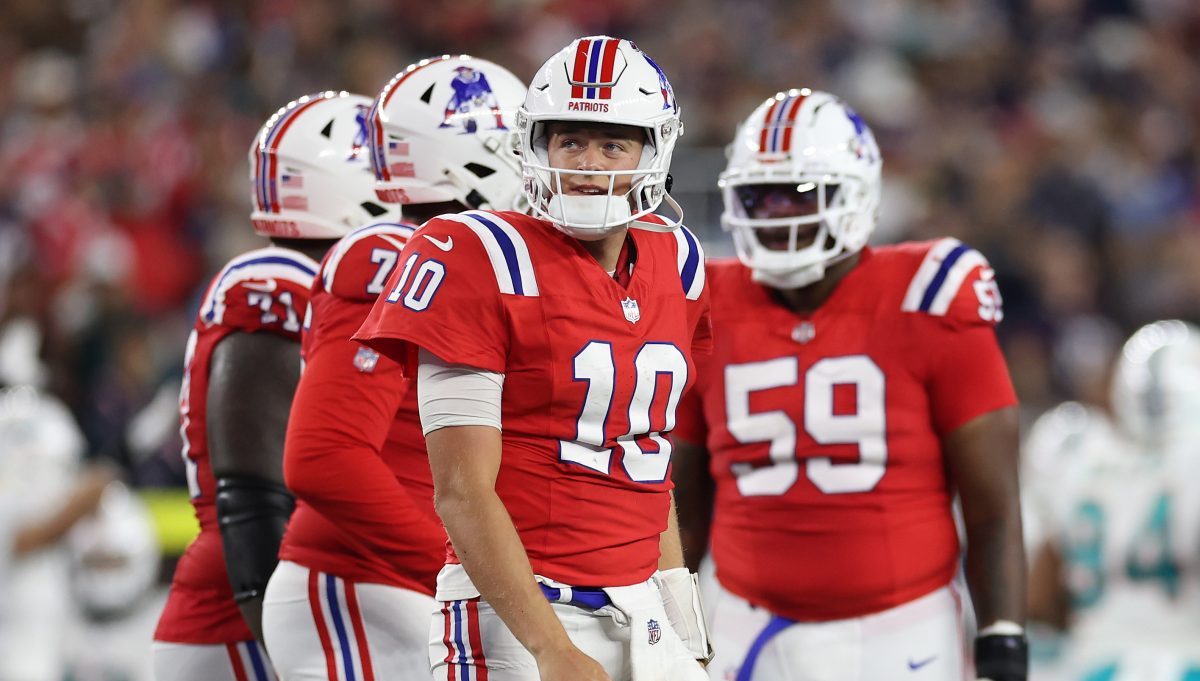FOXBORO -- Neither the Dolphins nor the Patriots set the scoreboard ablaze on Sunday night. They combined for 41 points (congratulations, under bettors). Neither quarterback cracked a 100.0 rating.
Still, this game served as the latest in a long-running list of reminders: It's an offensive game, dominated by explosive offensive players.
The Patriots fell behind 17-3 in part because of the explosive playmaking ability of Miami's undersized burners Tyreek Hill and Jaylen Waddle.
Stay in the game with the latest updates on your beloved Boston sports teams! Sign up here for our All Access Daily newsletter.
Early in the game, the Patriots played with what appeared to be three deep safeties -- raise your hand if you predicted Bill Belichick would have his defense looking like a Big 12 team early in this one -- just to try to limit Dolphins playmakers down the field. That softer coverage allowed the Dolphins a whopping 55 percent success rate on their first drive of the game, but New England buckled down in the red zone to force a field goal.
On the following drive, after a fumble from Patriots rookie receiver Demario "Pop" Douglas, Miami found Waddle for two explosive pass plays that accounted for 43 yards, fueling a touchdown drive.
MORE PATRIOTS COVERAGE
The Dolphins scored again when wideout River Cracraft hit the Patriots for two grabs for 34 yards. Hill crossed the goal line on a short pitch-and-catch, the highlight of his pedestrian five-catch, 40-yard stat line. But that line doesn't do his contributions justice. His mere presence on the field helped open things up for others to put the Patriots in a hole they couldn't escape. On Hill's touchdown drive, Tua Tagovailoa found openings everywhere to go 7-for-7 for 69 yards.
"He had 211 yards last week," Patriots safety Jabrill Peppers said of Hill. "Obviously he was a focal point. We tried to make them beat us other ways and they beat us other ways. We gotta do a better job completely across the board, myself included first and foremost."
Peppers was tasked with helping double-team Hill for a large portion of the game. It began with second-year corner Marcus Jones tracking Hill in coverage with Peppers looming close by. Later, after Jones injured his shoulder, it was rookie Christian Gonzalez who became the primary coverage option. But attention paid to Hill helped create space for other Dolphins options.
Peppers didn't hesitate when asked if the Patriots were willing to concede shorter gains in order to protect against explosive scores. The Dolphins put together drives of 13, 11 and eight plays that resulted in points. The defensive approach for the Patriots also may have contributed to them conceding 4.8 yards per carry and 145 yards rushing.
"For sure," Peppers said when asked if the Patriots were amenable to allowing smaller gains to defend chunkier ones. "Offenses that are explosive like that, you want to make them snap the ball as many times as possible. Offensive coordinators aren't patient enough to keep taking five, eight-yard gains. They want the big play. Especially when they've got guys who can make those big plays.
"We're OK with it, but we didn't do a good job of stopping the run. We didn't do a good job of setting the edge. Missed too many tackles. That's what the game comes down to."
When the Patriots found themselves in a two-score hole at the half, they didn't have the explosive playmakers to threaten Miami in the same way.
🔊 Patriots Talk: Patriots’ self-inflicted wounds doom them vs. Dolphins | Listen & Subscribe | Watch on YouTube
Mac Jones was 25-for-26 on passes thrown fewer than 10 yards beyond the line of scrimmage (or behind the line). He was 6-for-15 on anything thrown beyond 10 yards downfield, and he was 0-for-5 on anything thrown at least 20 yards down the field.
"It's tough, right? You've got three new guys on the line," Jones said when asked about his line's play and if that impacted their deep passing game. "Those guys (left guard Cole Strange, right guard Mike Onwenu, left tackle Vederian Lowe) came in, played really hard. It's a tough front to go against. So sometimes it's a part of the game plan.
"Coach [Bill] O'Brien obviously wanted to throw it downfield, but you got to kind of take what the defense gives... So tough, tough day on the yard. But I definitely want to find ways to get it down the field more to help our defense."
The Patriots were sacked four times. Cole Strange was called for holding. They ran for 3.2 yards per carry with their backs, and they couldn't protect long enough to try shots down the field. On one of their deeper throws of the night, DeVante Parker was ridden out of bounds by corner Xavien Howard and Mac Jones threw into the no-window coverage for an interception.
"We've got to have better discipline all around," Patriots center David Andrews said. "We just couldn't finish. We can't beat ourselves. Turnovers again, penalties in crucial moments. We've just got to do a better job when it matters the most and stop playing from behind.
"It's two weeks in a row playing from behind. It's hard to play catch-up in this league when you're playing good teams, good defenses. It's not how you want to play the game, playing from behind. It's hard, very hard."
The biggest issue, though -- and Andrews was getting to it with his playing-from-behind comment -- was that despite all those mistakes, the offense didn't have the explosive ability to overcome an early deficit. Line couldn't protect it. Receivers couldn't execute it. (Probably didn't help that one of their fastest, Douglas, didn't play again offensively after his fumble.)
Their margin for error, as currently constituted, is wafer thin. Not the case for the team on the other sideline, which made plenty of mistakes of its own. That was the difference.



